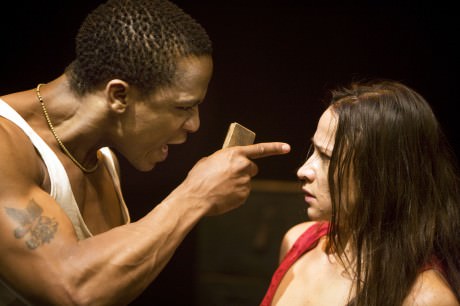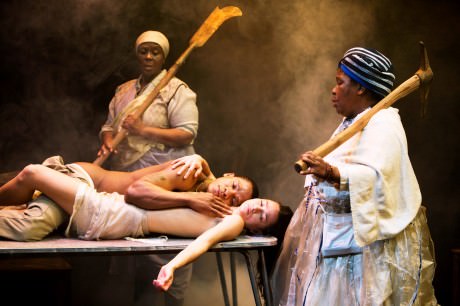Flames blaze in the name of truth, liberty, and land!
Where there is repentance, there is hope.
Without it, there is only despair.
The renowned Miss Julie (Fröken Julie) by August Strindberg has become one of the world’s most durable and performed plays. Mies Julie, the exhilarating award-winning South African visionary interpretation of Strindberg’s classic, makes it Washington premiere as the hottest ticket in town, and plays in a limited run until November 24, 2013 as the first selection of the 2013-2014 Shakespeare Theatre Company’s Presentation Series at The Landsburgh Theatre.

Written and directed by Yael Farber, the Baxter Theatre Centre at the University of Cape Town in association with the South African State Theatre have produced an impassioned, unflinching, and intimate reveal into the deep complexities of a post-apartheid South Africa and the legacy of vengeance. Mies Julie is a sensual stimuli of the senses exhibiting the breathtaking strength of Farber’s fresh, lyrical dialogue and her visceral direction that values the complexity of the characters in the play and the intelligence of its audience. It is a testament to Farber’s writing talent how seamless the original Miss Julie has been successfully modified to incorporate the different socio-political context of modern day South Africa.
One of the most important things great Theatre can do is prompt reflection and give the audience questions to answer for themselves.
Mies Julie promises to provoke an electric after-theater discussion. The fearless storytelling forces audience members to reflect about how we come to terms with the history that has formed our cultural identity. Exposing the subtext and underbelly of the struggles of a strained present day situation, Mies Julie makes aware the bitter political disputes over race and land rights that may have never before been given a second thought.
Don’t let the thematic heft of Mies Julie intimidate you from seeing this urgent and revelatory piece of theater. This fierce theatrical experience pushes and crosses the boundaries, leaving an indelible mark on the psyche. It is a rewarding, rare privilege to witness the ambitious gravitas of potent international Theatre that is politically relevant and unafraid to take risks.
Yael’s Farber’s Mies Julie is more than an adaptation of the Swedish dramatist’s 1888 play. It’s a reimagining. Class and gender issues remain tensions in this torrid tale, but Farber has transcended the extreme distinctions between the social classes by expanding the milieu.
In the smouldering kitchen of a remote South African farmstead, nineteen years after the end of apartheid, Farber has revitalized Strindberg’s Miss Julie with a political and historical relevance, in addition to renewing the heightened sexual charge of the inflammatory Miss Julie.
With an update come a few changes, and the role of Christine (Thoko Ntshinga) has brilliantly been recast as his John’s mother (and Julie’s childhood care giver) replacing the role of John’s fiancee (as is in the Strindberg version). The play has been modified to the new surroundings and is transposed to present-day South Africa during the annual Freedom Day celebrations (This annual April 27th holiday celebrates the first post-apartheid elections held in 1994, and resulted in Nelson Mandela’s becoming President).
Mies Julie begins with the haunting soundscape created by musicians/composers Daniel and Matthew Pencer, who perform and remain on stage with a saxophone and other instrumental sounds immediately setting the mood and creating atmosphere throughout the evening. The rich, luminescent tinges created by the amber lighting gels set the tone of passion… and heat.
Set and Lighting Designer Patrick Curtis’ kitchen set includes a slow-moving, three blade ceiling fan that methodically gyrates above the kitchen heat and the makeshift stove. There is a table with three chairs, and two rows of work boots neatly aligned on a bench and underneath. The red tile floor which rests upon layers of the earth is as simple is the rest of the set – and as it should be. But what makes this scene unusual is the large protruding tree stump that rises through the tiled floor as a sort of showpiece that the kitchen has been built around. The prominently displayed former tree is a source of pride, and a reminder of the pain (and buried bodies) from the past. The sole setting of the play in the kitchen represents the conflict among the three characters: yesterday (Christine), today (Julie), and tomorrow (John).
On a single night, fueled by drink and generation-resentments, a young, white Afrikaans woman, Mies Julie (Hilda Cronje), and her father’s servant, Xhosa farm laborer, John (Bongile Mantsai) peel away the layers of contempt as they negotiate remembrance and battle over power, sexuality, mothers, and land restitution. But they are not meeting as equals, and the two become entangled in a lustful game of superiority. The barriers that have separated and protected John and Julie from each other over the years, spiral out of control to uncover John’s transformation from weakness to a newly realized power, and the oscillation of Mies Julie’s entitled, seductress temperament to that of a caged bird. Speaking of caged birds… Farber’s stylistic symbolism on stage speaks volumes by the continuous illumination of a bird cage in the background with strong side lighting. Representing Mies Julie’s limited reach in an alienated world, the bird and the cage are a metaphor for the fragile, controlled nature of her solitary existence.
Hilda Cronje’s pours her soul into a performance that is volatile and unrelenting. With every grimace, forced enunciation, and clinched fist, I winced and felt her pain. As Mies Julie she is so tightly wound, emotionally and physically, that one can literally feel the force of her desperation and the build up and sheer energy of her desirous, primal passion. She is broken. There is a volcano of loneliness and low self-esteem that runs deep, but she loves the land, and her fighting spirit is forever connected to it.
Bongile Mantsai displays such confidence and authenticity. He not only knows himself – more importantly – he knows his character. And, what is so engrossing about his naturalistic performance is that one can’t distinguish between the two. He’s that believable, and seeing Mantsai on stage as John is like being a voyeur into a private moment. This clever, intelligent character is more than frustrated; his fury is torn between two worlds. John’s on a mission to “take back what belongs to us,” and he is fully aware of the possibilities of life outside the farm and true independence.
The intensity and physicality of the performances are a visual workout and mental exercise. They challenge each other with raw energy, and by the end Mantsai and Cronje are visibly panting, drenched with sweat and heartfelt determination. The interplay between the two is a dance – the fluid cadence of their dialogue in rhythm with the beautiful choreography of their movements.
This dance is a dance of death. “When people turn violent—you know you’ve told the truth, “says Julie in a heated exchange with John, “There’s something to be said for violence. Let’s you know where you stand.”
Thoko Ntshinga as Christine wins your heart as much as she breaks it with her powerful sense of purpose and her unyielding faith in God. As the moral center of Mies Julie, Christine is a vital part of this story continuing the historical context and informing the storied past of apartheid. The ghost-faced Tandiwe Nofirst Lungisa is unforgettable as the spiritual ancestor, intoning guttural moans and songs of the traditional rural Xhosa music as she walks the farm’s perimeter.

Playwright-Director Yael Farber’s Mies Julie has created a play and its themes faithful to August Strindberg with a potency and relevancy for today’s audiences. Two decades after the end of apartheid, Strindberg’s incendiary tale of class warfare and sexual emancipation becomes a metaphor for the post-Apartheid South Africa. Mies Julie not only soars, it surpasses all expectations as a thriving theatrical update and legitimately excels as its own genuine contribution to innovative international Theatre. Mies Julie has won several top awards including the Carol Tambor Best of Edinburgh Award at the 2012 Edinburgh Fringe Festival.
I can’t recommend Mies Julie more highly. It’s one of the most memorable shows of the year and a passionate and evocative production you can’t afford to miss.
Where there is repentance, there is hope.
Without it, there is only despair.
Running Time: 90 minutes, with no intermission.
Mies Julie plays through November 24, 2013, at Shakespeare Theatre Company’s Landsburgh Theatre – 450 7th Street, NW, in Washington, D.C. For tickets, purchase them online, or call the box office at (202) 547-1122
Mies Julie contains strong adult themes and nudity. Recommended for audiences aged 16+.
LINK
Magic Time! Reflections on ‘Mies Julie’ by John Stoltenberg.





